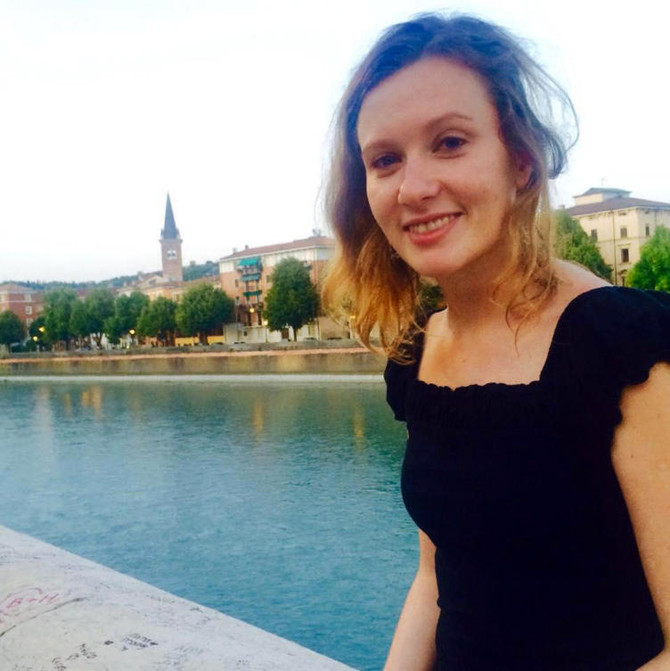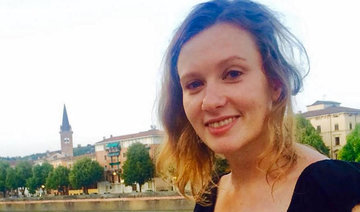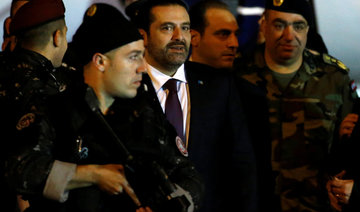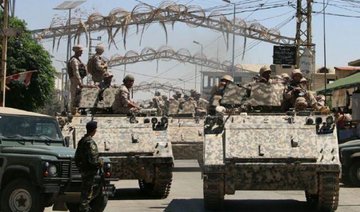BEIRUT: Lebanese security forces have arrested a Lebanese taxi driver for killing Rebecca Dykes, a British woman who worked at the British Embassy in Beirut and was found dead on the Metn Expressway on Saturday Morning.
The arrest was confirmed by the Lebanese National News Agency (NNA) correspondent. “The Information Branch of the Internal Security Forces managed to arrest the killer. He was identified as Tarek H., a taxi driver,” said the news agency.
The agency quoted its correspondent as saying that “Tareq had picked up Dykes on Friday evening from Beirut’s Gemmayzeh district where she was on a night out. He drove her from Ashrafieh to the Metn Expressway where he attempted to rape her. He then strangled her with a rope and threw her body away.”
The NNA correspondent said that the Information Branch managed to identify and arrest the killer — who admitted to the crime — after following his car on the Traffic Management Center’s road monitoring cameras between Ashrafieh and Nahr Al-Mot area.
According to a source quoted by Reuters, “the motive was purely criminal, not political.”
Dykes had worked at the British Embassy for the Department for International Development, her LinkedIn page said.
British ambassador to Lebanon Hugo Shorter said on Sunday: “The whole embassy is deeply shocked, saddened by this news.”
Dykes’ family said in a statement issued by Britain’s Foreign Ministry: “We are devastated by the loss of our beloved Rebecca. We are doing all we can to understand what happened.”
Killer of British diplomat in Lebanon arrested
Killer of British diplomat in Lebanon arrested

Released Palestinian student to help launch immigrant legal aid initiative in Vermont

- Mohsen Mahdawi, 34, who led protests against Israel’s war in Gaza at Columbia University, spent 16 days in a state prison
- “We will not fear anyone because our fight is a fight for love, a fight for democracy, a fight for humanity,” Mahdawi told supporters
VERMONT: A Palestinian student arrested during an interview about finalizing his US citizenship is helping to launch an initiative to help other immigrants facing deportation in Vermont on Thursday, a week after a federal judge freed him from custody.
Mohsen Mahdawi, 34, who led protests against Israel’s war in Gaza at Columbia University, spent 16 days in a state prison before a judge ordered him released on April 30. The Trump administration has said Mahdawi should be deported because his activism threatens its foreign policy goals, but the judge ruled that he has raised a “substantial claim” that the government arrested him to stifle speech with which it disagrees.
Immigration authorities have detained college students from around the country since the first days of the Trump administration. Many of them participated in campus protests over the Israel-Hamas war, which has killed more than 52,000 Palestinians. Mahdawi was among the first to win his freedom after challenging his arrest.
“Justice is inevitable. We will not fear anyone because our fight is a fight for love, a fight for democracy, a fight for humanity,” Mahdawi told supporters outside the courthouse last week.
He will join Vermont State Treasurer Mike Pieciak, Senate Majority Leader Kesha Ram Hinsdale and community advocates at the Statehouse to announce the Vermont Immigration Legal Defense Fund. The group, which also includes lawyers and philanthropists, says the goal is to improve access to legal advice for immigrants and build long-term infrastructure within the justice system as it pertains to immigration law.
Members of Vermont’s congressional delegation have spoken up on Mahdawi’s behalf, as have state politicians. Vermont’s House and Senate passed resolutions condemning the circumstances of his detention and advocating for his release and due process rights.
Republican Gov. Phil Scott has said there is no justification for the manner in which Mahdawi was arrested, at an immigration office in Colchester.
“Law enforcement officers in this country should not operate in the shadows or hide behind masks,” the governor said the next day. “The power of the executive branch of the federal government is immense, but it is not infinite, and it is not absolute.”
Mahdawi, a legal permanent resident, was born in a refugee camp in the Israeli-occupied West Bank and moved to the United States in 2014. At Columbia, he organized campus protests and co-founded the Palestinian Student Union with Mahmoud Khalil, another Palestinian permanent resident of the US and graduate student who was arrested in March.
His release, which is being challenged by the government, allows him to travel outside of his home state of Vermont and attend his graduation from Columbia in New York later this month.
UN chief voices ‘grave concern’ after Sudan’s aid hub rocked by 5 days of drone attacks

- Port Sudan is the country’s main entry point for humanitarian aid
- Country’s brutal civil war has killed tens of thousands, displaced millions
NEW YORK CITY: The UN secretary-general has voiced “grave concern” over repeated drone attacks on the eastern Sudanese city of Port Sudan, the country’s main entry point for humanitarian aid.
The city faced a new drone strike on Thursday for the fifth consecutive day amid a fierce confrontation between the Sudanese Armed Forces and Rapid Support Forces paramilitary.
The attacks have led to an exodus of civilians from the city, which hosts UN offices and aid agencies, and is the seat of power of the army-backed government.
Sudanese army officials have blamed the RSF for the strikes, which have targeted the city’s port, largest operational fuel depot, central power station and airport, among other sites.
UN Secretary-General Antonio Guterres warned that the attacks “threaten to increase humanitarian needs and further complicate aid operations in the country,” his spokesman, Stephane Dujarric, said on Wednesday.
“The secretary-general is alarmed at the expansion of the conflict into an area that has served as a place of refuge for large numbers of people displaced from the capital, Khartoum, and other areas,” he added.
Sudan’s brutal two-year-long civil war has killed tens of thousands of people and displaced more than 13 million.
The conflict has created “the biggest humanitarian crisis ever recorded,” the International Rescue Committee has said.
“The secretary-general reiterates that all parties to the conflict must comply with their obligations under international humanitarian law,” Dujarric said.
“They must not direct attacks against civilians and civilian objects; must take all feasible precautions to avoid, and in any event to minimize, incidental civilian casualties; and must allow and facilitate rapid and unimpeded passage of humanitarian relief for civilians in need.”
Almost all humanitarian aid enters the Northeast African country through Port Sudan.
The Chinese Embassy in Sudan on Thursday called on all Chinese citizens to leave the country as soon as possible.
Guterres is “concerned at the lack of political will of the parties to return to the negotiating table, preferring instead to continue pursuing their military objectives,” Wednesday’s statement said.
“The secretary-general calls on the parties to engage constructively with the mediation support mechanisms already in place to assist the parties to reach a political solution, underscoring the UN’s continued support to help find a way out of this crisis.
“He renews his call for an immediate cessation of hostilities and stresses that dialogue is the only way to achieve the peace that the people of Sudan demand.”
Syria believed to make no purchase in 100,000 T wheat tender, traders say

- Traders said Syria could issue a new purchase tender soon
- Shipment was sought within 45 days from the contract award
HAMBURG: A Syrian state grains agency is believed to have made no purchase in an international tender seeking 100,000 metric tons of milling wheat which closed in April, European traders said on Thursday.
Traders said Syria could issue a new purchase tender soon.
Shipment was sought within 45 days from the contract award.
Syria had bought about 100,000 tons of wheat in its previous tender reported on March 25, which was believed to be the first large purchase tender since the change of power in Syria late last year.
But the donation by Iraq of 220,000 tons of wheat to Syria was expected to be used for Syria’s immediate import requirements, traders said.
Chinese embassy in Sudan urges citizens to evacuate amid security concerns

- The embassy warned of dwindling supplies of water, electricity and fuel
BEIJING: The Chinese embassy in Sudan on Thursday issued a statement urging Chinese citizens in the country to evacuate as soon as possible, citing deteriorating security situation and rising security risks.
The embassy warned of dwindling supplies of water, electricity and fuel, and advised citizens to evacuate via ships to Saudi Arabia or available international flights, or to travel by land to Egypt.
Drone strikes spark civilian exodus from army-controlled Sudan aid hub

- Port Sudan on the Red Sea coast had been regarded as a safe haven, hosting United Nations offices and hundreds of thousands of displaced people
- RSF drone strikes on Port Sudan this week hit key facilities including the country’s last functioning international airport
PORT SUDAN: Paramilitary drones struck army-held areas of eastern and southern Sudan for a fifth straight day Thursday, army sources said, prompting an exodus of civilians from Port Sudan, seat of the army-backed government.
Attacks targeted the country’s main naval base outside Port Sudan, as well as fuel depots in the southern city of Kosti, two sources said, speaking on condition of anonymity.
“The militia launched another drone attack on the Flamingo Naval Base north of Port Sudan,” one source told AFP on condition of anonymity, referring to the paramilitary Rapid Support Forces (RSF), at war with the regular army since April 2023.
Explosions were heard across the city, an AFP correspondent reported.
Port Sudan on the Red Sea coast had been regarded as a safe haven, hosting United Nations offices and hundreds of thousands of displaced people, until drone strikes blamed on the RSF began on Sunday.
The port city is the main entry point for humanitarian aid into Sudan, and UN chief Antonio Guterres warned the attacks “threaten to increase humanitarian needs and further complicate aid operations in the country,” his spokesman Stephane Dujarric said.
Nearly 1,100 kilometers (some 680 miles) to the southwest, in the army-controlled city of Kosti in White Nile state, RSF drones struck fuel depots, setting off massive fires, a military source said.
“The militia targeted the fuel depots that supply the state with three drones, causing fires to break out,” the source told AFP on condition of anonymity.
There were no immediate reports of any casualties.
More than two years of war have killed tens of thousands of people and uprooted 13 million, according to UN figures.
RSF drone strikes on Port Sudan this week hit key facilities including the country’s last functioning international airport, its largest working fuel depot and the city’s main power station.
An army source said air defenses had shot down 15 drones over the city overnight.
At Port Sudan’s bustling main bus station, civilians were scrambling to leave.
“You can’t get a ticket without booking over a day in advance now, all the buses are booked,” said bus company employee Mahmoud Hussein.
Among those fleeing was Haidar Ibrahim, preparing to travel south with his family.
“The smoke is everywhere and my wife suffers from asthma,” he told AFP. “We have no choice but to leave.”
Many of those who had sought refuge in Port Sudan have been displaced multiple times before, fleeing each time the front line closed in.
Transport costs have nearly doubled as a result of fuel shortages triggered by the attacks.
“Now, we have to buy fuel on the black market,” said tuk-tuk driver Abdel-Meguid Babiker.
On Wednesday evening, drones were also seen over the army-held eastern city of Kassala and northern city of Merowe, prompting anti-aircraft fire.
Eight-country east African bloc, the Intergovernmental Authority on Development (IGAD), called the attacks on civilian infrastructure in Port Sudan “unacceptable” and demanded an “immediate end.”
“Any assault on this critical hub further compounds human suffering and impedes the delivery of urgently needed assistance,” IGAD executive secretary Workneh Gebeyehu said in a statement.
The RSF has not commented on the drone strikes, which have hit targets hundreds of kilometers away from their closest known positions on the outskirts of greater Khartoum.
The paramilitaries have ramped up their drone campaign since losing control of nearly all of greater Khartoum to the army in March.
On Tuesday, the army-backed government severed ties with the United Arab Emirates, accusing it of supplying the RSF with advanced weapons systems.
The UAE denied the allegation, adding that the internationally recognized administration “does not represent the legitimate government of Sudan.”
The paramilitaries and their allies have moved to establish a rival administration in areas under their control.
Abu Dhabi has repeatedly denied arming the RSF, despite reports from UN experts, US politicians and international organizations.
The war has effectively split the country in two, with the army holding the north, east and center, and the RSF in control of most of Darfur and parts of the south.




















